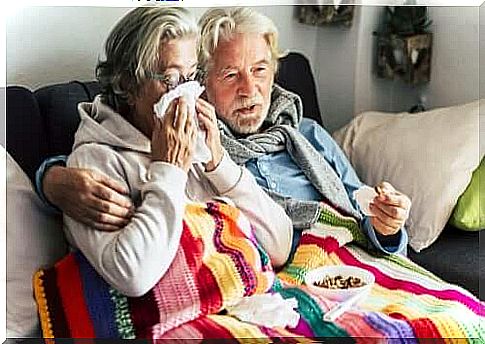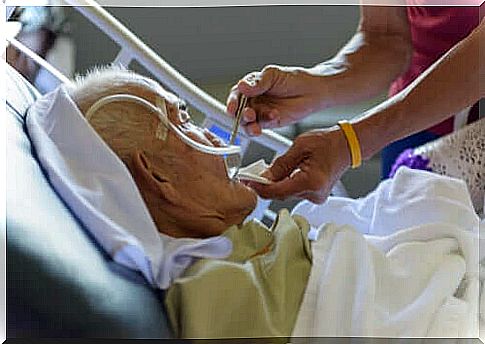Who Are The Most Vulnerable To COVID-19?
The coronavirus can infect anyone, but certain groups of the population are more vulnerable to COVID-19 than others. Not because they present a greater risk of infection, but because the consequences of infection in these groups are more serious. We explain all of this in more detail in this article.

The fact that certain groups of the population are more vulnerable to COVID-19 undoubtedly represents the real emergency behind all these preventive measures applied in many countries, including quarantine. Certain groups of the population are at risk, because the consequences of contamination with the coronavirus are more serious in these groups.
The virus that first hit the city of Wuhan in China has crossed borders and spread around the world. This virus is today responsible for the many cases of contamination which are multiplying very rapidly all over the world, in countries far removed from Asia.
The studies on coronavirus genome have shown that this is not the same particle flows. If it is the same virus, the genetic information has undergone a mutation.
In any case, the epidemiological profile of this virus seems to be maintained. Humans can infect each other through droplets of respiratory secretions. These droplets carry the virus and can stay on some surfaces for a while.
The risk of contamination of this coronavirus between humans is high. If the rate of transmission between people is high, it is because of the proteins present on its envelope, which bind to human cell receptors. In the pulmonary alveoli, this virus causes greater damage.
But people are not equally vulnerable to COVID-19. Find out in the rest of this article which population groups are most at risk of suffering from respiratory complications.
Seniors are among the most vulnerable to COVID-19
One of the population groups that suffer the most from the consequences of the coronavirus are the elderly. Especially those over 65 years old. We observe that the case fatality rate increases considerably with age.
Based on the available data, COVID-19 causes death in nearly 4% of those infected, but in infected elderly people, the case fatality rate drops to 15%. These statistics show that older people need more attention and more care during this pandemic.
As is the case with other viral respiratory infections, such as seasonal influenza, for example, particles of infectious agents take advantage of the weakened condition of old respiratory cells. The immune system becomes slower and its response does not arrive in time.
Also, if the elderly are more vulnerable to COVID-19, it is because they generally suffer from comorbidities that accompany aging. Diabetes, hypertension and cancer are common comorbidities.

The chronically ill, people more vulnerable to COVID-19
Like the elderly, the chronically ill are more vulnerable to COVID-19. People who suffer from the following diseases are most affected:
- Heart failure
- Diabetes
- Renal failure
- Arterial hypertension
- Chronic obstructive pulmonary disease
- Cancer
The chronically ill not only suffer from the vicissitudes of the disease, they also take drugs which have their own side effects and interactions.
In the case of anticoagulated patients, we can assume that forced internment due to pneumonia caused by the coronavirus is a serious complication. Intensive therapy methods involve the rupture of blood vessels which are limited in their repair by anticoagulant drugs.
One study in particular linked cardiovascular disease with a greater risk of death from the coronavirus. Additionally, patients who participated in these studies had high biochemical indicators of inflammation in the blood.

The relationship between pregnant women and COVID-19
When determining which people are most vulnerable to COVID-19, the case of pregnant women was raised. What is certain is that there is a principle of precaution in medicine
with regard to pregnant women. Although there is no concrete information on the intensity of the risk in pregnant women, they must isolate themselves well as a preventive measure.
What we know at the moment is that the risk of infection in pregnant women is similar to that of the rest of the population. This situation differs from that of pregnant women during the H1N1 influenza pandemic that took place in 2019: pregnant women were the people who suffered the worst consequences.
Likewise, for the moment, vertical transmission of the virus has not been demonstrated. There is no scientific evidence to indicate that the virus crosses the placenta and therefore passes from mother to fetus.
Another scientific study differentiated people affected by the coronavirus based on their blood group. Preliminary results suggest that people with blood group A are at significantly greater risk than those with group O. But it should be noted that the number of participants was limited.
To take into consideration
Those most vulnerable to the virus are at notorious risk of suffering complications that can lead to death. Care, hygiene and social isolation are essential measures for these people. Health systems do not have enough beds to care for possible new serious and complicated cases. This is why we must help them by staying at home in order to reduce the contaminations curve.









